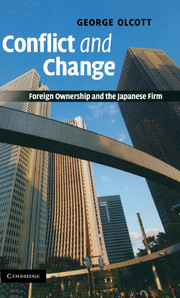Book contents
- Frontmatter
- Contents
- List of figures
- List of tables
- Acknowledgements
- Introduction
- 1 Japanese institutions: are they different?
- 2 The study: overview and methodology
- 3 Entering the firm: recruitment and training
- 4 Lifetime employment and career patterns
- 5 Reward systems
- 6 Female employees
- 7 Organisation and decision-making process
- 8 Discussion and conclusion
- Index
5 - Reward systems
Published online by Cambridge University Press: 20 January 2010
- Frontmatter
- Contents
- List of figures
- List of tables
- Acknowledgements
- Introduction
- 1 Japanese institutions: are they different?
- 2 The study: overview and methodology
- 3 Entering the firm: recruitment and training
- 4 Lifetime employment and career patterns
- 5 Reward systems
- 6 Female employees
- 7 Organisation and decision-making process
- 8 Discussion and conclusion
- Index
Summary
As was indicated in the Introduction, the role of market forces in the determination of rewards for Japanese employees is less evident than in other countries. Dore (1973) found that, apart from complexity, the Japanese wage system had nothing in common with the British system:
Just as the lifelong contract implicit in the employment relation involves looking at that relation as a good deal more than a temporary arrangement for the purchase of a particular type of skill, so the wages paid in Japanese factories take account of many factors – a man's age, seniority, education, demonstrated “cooperativeness” and so on – which have little to do with the notion of a “market price” for skills determined by a balance between supply and demand.
(p. 74)While there is a view that the reward system is just another element of a unique cultural tradition that emphasises equality and stability – Abegglen (1958) calls the system “indirect and paternalistic” – most commentators see strong rational foundations. An important element of the rationalist explanation is the development of the “lifecycle” wage system, which we mentioned earlier. However, as this practice became institutionalised during the decades following the end of the war, the importance of the experience that comes with tenure was emphasised to give seniority wages the sense of legitimacy that has sustained it until the present day. Thus, although economic growth rendered the concept of the livelihood wage less meaningful, and technological progress theoretically eroded the relationship between seniority and skill, the influence of seniority has been remarkably persistent in the modern Japanese employment system.
- Type
- Chapter
- Information
- Conflict and ChangeForeign Ownership and the Japanese Firm, pp. 139 - 179Publisher: Cambridge University PressPrint publication year: 2009
- 1
- Cited by

